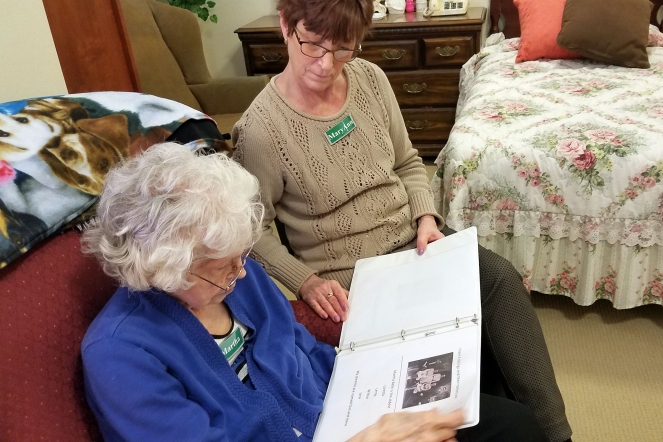
An interview with Anne Kelly, Head of Montessori for Dementia and Ageing, AMI.
At AMI we are further developing our work in ageing and dementia, and we are so pleased to welcome Anne Kelly to the global team as Head of Montessori for Dementia and Ageing. We talked to Anne about how the work is progressing in what has been a difficult 18 months for the elderly community.
How did you discover Montessori and when did you realise it had value for elders?
Sometimes one can just be in the right place at the right time and such a situation led me to Montessori. I was attending a work meeting in Adelaide about 15 years ago and because I could not get a flight back home for two days, I decided to sit in on a “Montessori activities for people with dementia” workshop. Half-way through the morning I knew I had found the aged care holy grail I had been searching for over many years of aged care nursing. And so began my journey of discovery, the journey that has changed my life forever, one that has also changed many other peoples’ lives as well and now that journey has taken another turn as I join the AMI team.
What impact have you seen the approach make to people living with dementia?
There are so many positive outcomes of a Montessori approach for elderly people, especially those living with dementia. Everybody needs to feel that they matter, to feel valued, respected, to be as independent as possible and have a reason to get out of bed every day. A Montessori approach meets all these needs and more. A Montessori culture has transformed an angry, sad, lonely elder with no hope into an elder that has a tomorrow to look forward, an elder who is able to contribute to their community, where their strengths are seen and used to enhance independence and quality of life and where their memory loss is supported and life again offers them a reason to get out of bed every day.
Are these techniques that people can do at home to support family members?
The wonderful thing about Montessori is that it can be implemented in any environment where an elder spends time including in the family home. By using Montessori for Dementia and Ageing principles, a person can be supported in their own home to maintain independence and quality of life. Care partners and family members can learn how to implement strategies that support independence and meaningful engagement. A task breakdown on a wardrobe door can result in a person being able to dress themselves without assistance. Strategies that help to maintain safety and medication management can enable people to remain in their own homes for longer. Outcomes can be positive for all.
How has the pandemic impacted the Montessori aged care community and how have they been able to maintain the Montessori approach during this time?
The pandemic has changed so much and in the early days older people in residential care communities were isolated from family and friends for months. They became prisoners in their rooms. The residents who lived in care communities who had a Montessori focus often actually did better, as a Montessori approach has a focus on meaningful activity for each person and therefore many activities were designed as individual activities and hence these could be done in a person's room during lockdown. Unfortunately, a lot of Montessori practice around meals in particular were stopped but they are now slowly returning. COVID will however continue to challenge Montessori practice in some areas. We need to ensure as we move forward that COVID is not the excuse used for doing nothing or not allowing residents to participate in both meal preparation or serving.
You work with professionals across the world, is there a real difference in how societies care for their elders? Do governments need to do more?
Aged care depends on the approach in each individual country and tends to reflect many standards across many areas of a country. Elders generally can be the forgotten citizens, with not enough services or support. Of course, the richer countries do it much better than poorer countries but systems still rob people of their personhood, independence and dignity. All elders deserve the best care possible regardless of where they happen to live.
What are your future plans for your work with AMI and Montessori for Dementia and Ageing? Are there any specific communities you want to reach?
I feel so privileged to be given this opportunity to help move this important work to communities around the world. There is so much to do to improve outcomes for our elders, especially in poor countries. This is such new work and we have much to do, one priority will be to find, train and mentor new AMI Trainers in Montessori for Dementia and Ageing. This is how we change practice, by supporting countries to have their own AMI MDA Trainers. All we can do is go one step at a time. As long as we do not stop and keep moving forward our work will be rewarded by changing one life at a time.
What brings you most joy in your work?
Knowing that my work can help change lives and improve the quality of life for elders in their last months, years of life. We all, and they all, deserve this.
Archives
- « first
- ‹ previous
- 1
- 2
- 3